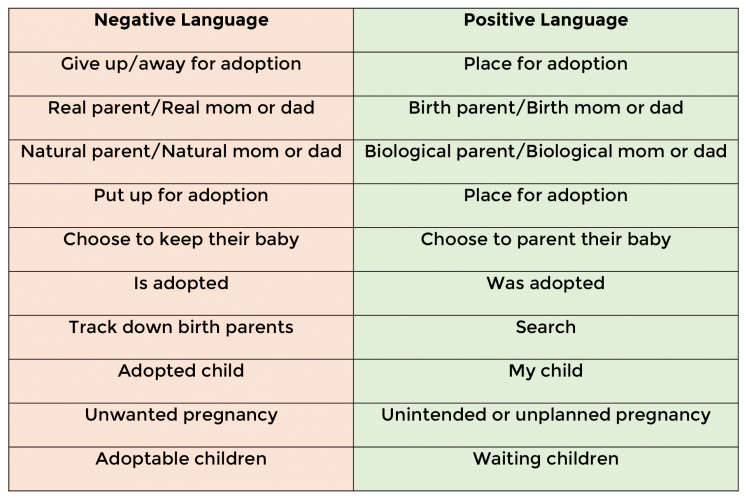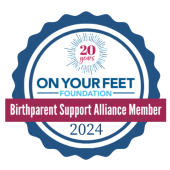Positive Adoption Language
Most people have a general understanding of what adoption is. Even if they don’t personally know anyone who was adopted or has adopted a child themselves, are likely familiar with the idea that adoption means a child was “given up” by their biological parent and is raised by their adoptive parent. With this general understanding of adoption comes common terms that people typically use when talking about it. We’ve already mentioned one, “giving up” a child, but there are many other sayings that are regularly used, like “real mom/real dad”, “put up for adoption”, or “gave away for adoption”.
When these terms are used, it is not meant with ill intention toward the adoptee, the birth parent, or the adoptive parents. In most cases, people use these words because it is the only language they are familiar with. The problem with that is much of the language commonly used to talk about adoption has an inherently negative bias. It evokes the idea that birth parents don’t care about their child, that adoptive parents have a lesser connection to their child, and that adoption is a negative thing which should not be talked about.
The reality of adoption is drastically different. Working closely with birth parents who are making an adoption plan for their child, we witness how hard the decision is to place. They have so much love for their child and often feel that if their circumstances were different, they may choose to parent. Most birth parents make an adoption plan not because they do not want to parent their child, but because they do not have the resources they need to give their child the life they want them to have. With love, they decide to put their child’s needs first, even though it may be heartbreaking for them.
With regards to adoptive parents, they are no less parents than those who grow their families through birth. Parents who adopt still spend sleepless nights comforting their crying babies. They still change all the dirty diapers, care for scraped knees, help with homework, and shuttle their kids to and from activities. Although they may not share the same genetic makeup as their child, they still provide for them and love them in the same way that other parents do.
Lastly, adoption is not something that needs to be seen as shameful or negative. The fact that someone was adopted is a big part of their story. Certainly, there may be times in an adoptee’s life where they have questions or struggle with the loss that comes with adoption. There may also be times when birth parents and adoptive parents struggle with things that are connected to adoption. Those challenges, however, do not make adoption an inherently bad thing. As we have mentioned, for a child to be placed for adoption takes so much love, care, and intention from both adoptive families and birth families. This is something that should be acknowledged, appreciated, and celebrated – not something that the adoptee is made to feel shameful about.
As we can see, there are many myths and misconceptions about adoption that are subtly reinforced by the language we use to discuss it. For the last several decades, the adoption community has been working to incorporate language that better represents what adoption truly means. This language is not only accurate, but it is respectful to those touched by adoption and encourages positive self-worth. With practice, education, and intention, it is our hope that positive adoption language will become the norm not only for those connected to adoption, but for the global community, as well.






